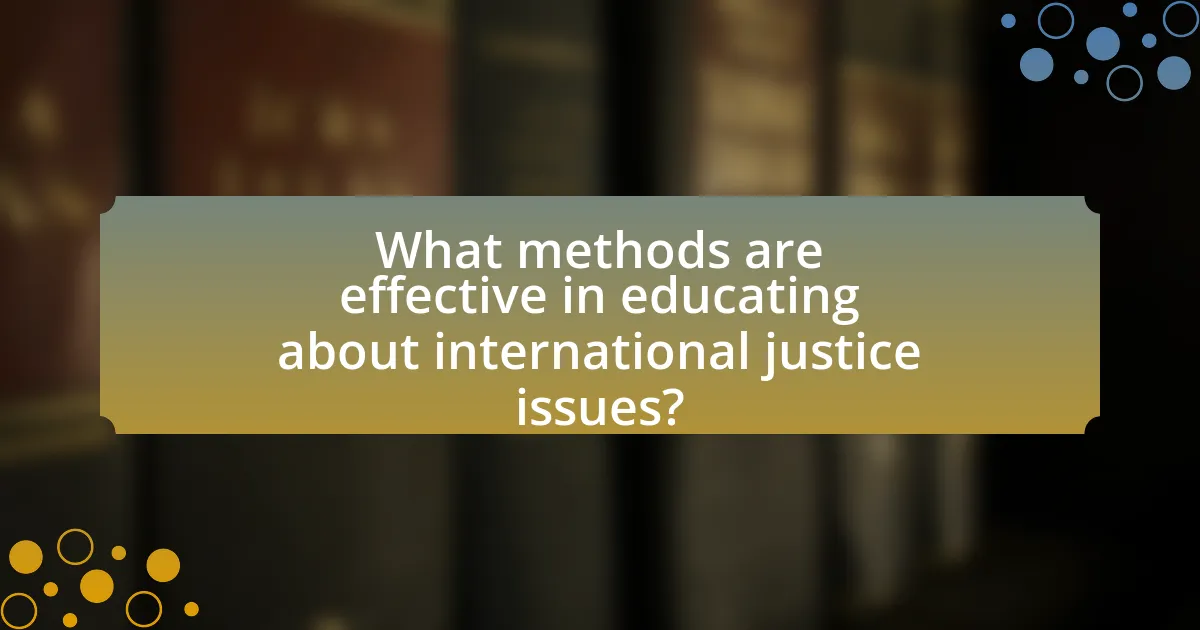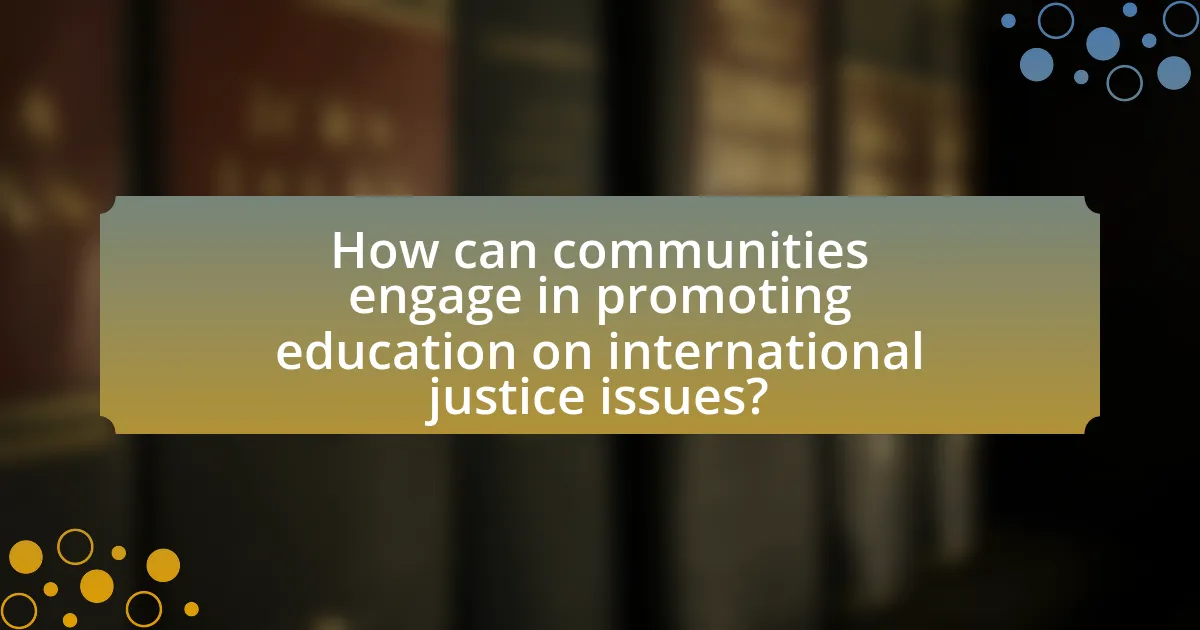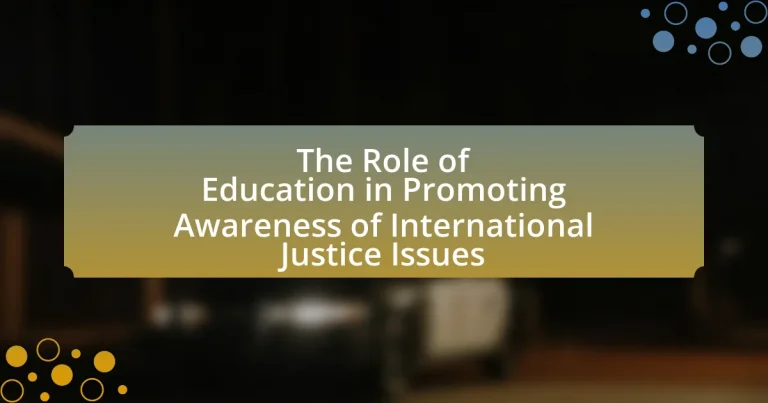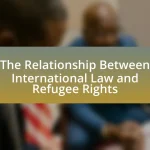The article examines the critical role of education in raising awareness of international justice issues, emphasizing its importance in understanding human rights, global inequalities, and justice mechanisms. It outlines how structured curricula, experiential learning, and diverse perspectives enhance students’ comprehension and engagement with complex global issues. Key components such as critical thinking, community involvement, and the use of technology are discussed as effective methods for promoting awareness. The article also highlights the consequences of a lack of awareness and the impact of informed public opinion on policy changes related to international justice.

What is the Role of Education in Promoting Awareness of International Justice Issues?
Education plays a crucial role in promoting awareness of international justice issues by equipping individuals with knowledge about human rights, global inequalities, and the mechanisms of justice. Through curricula that include topics such as international law, humanitarian crises, and social justice movements, education fosters critical thinking and empathy, enabling students to understand complex global issues. For instance, studies have shown that educational programs focused on human rights can increase students’ awareness and engagement in social justice initiatives, as evidenced by the findings of the United Nations Educational, Scientific and Cultural Organization (UNESCO), which emphasizes the importance of education in fostering a culture of peace and justice.
How does education contribute to understanding international justice issues?
Education enhances understanding of international justice issues by providing individuals with critical knowledge about human rights, legal frameworks, and global governance. Through structured curricula, students learn about historical injustices, contemporary conflicts, and the mechanisms of international law, which fosters a deeper comprehension of the complexities surrounding justice on a global scale. For instance, educational programs that include case studies of war crimes tribunals or human rights violations equip learners with analytical skills necessary to assess and engage with these issues effectively. Furthermore, research indicates that higher education levels correlate with increased civic engagement and advocacy for justice, as educated individuals are more likely to participate in discussions and initiatives aimed at promoting international justice.
What are the key components of education that facilitate awareness?
The key components of education that facilitate awareness include critical thinking, access to diverse perspectives, and experiential learning. Critical thinking enables individuals to analyze and evaluate information critically, fostering a deeper understanding of complex issues. Access to diverse perspectives, such as multicultural curricula, broadens students’ viewpoints and enhances empathy towards different cultures and experiences. Experiential learning, through activities like community service or simulations, allows learners to engage directly with real-world issues, reinforcing theoretical knowledge with practical experience. These components collectively contribute to a more informed and socially aware populace, essential for addressing international justice issues effectively.
How do different educational approaches impact awareness levels?
Different educational approaches significantly impact awareness levels by shaping how individuals perceive and understand international justice issues. For instance, experiential learning, which involves hands-on activities and real-world engagement, has been shown to enhance awareness more effectively than traditional lecture-based methods. A study by Kolb (1984) highlights that experiential learning fosters deeper cognitive processing, leading to increased empathy and understanding of complex social issues. Additionally, critical pedagogy encourages students to question societal norms and injustices, thereby raising awareness levels about international justice. Research by Freire (1970) indicates that this approach empowers learners to become active participants in their education, resulting in heightened awareness and advocacy for social change. Thus, the choice of educational approach directly influences the depth and breadth of awareness regarding international justice issues.
Why is awareness of international justice issues important?
Awareness of international justice issues is important because it fosters global understanding and accountability. By being informed about these issues, individuals can advocate for human rights, support victims of injustice, and influence policy changes. For instance, the International Criminal Court (ICC) addresses war crimes and crimes against humanity, highlighting the need for global cooperation in justice. Increased awareness can lead to public pressure on governments and organizations to uphold international law, as evidenced by movements that have successfully brought attention to atrocities and led to legal reforms.
What are the consequences of a lack of awareness?
A lack of awareness leads to uninformed decision-making and perpetuates injustices. Individuals who are unaware of international justice issues may fail to advocate for necessary changes, allowing systemic problems to persist. For instance, studies show that communities lacking education on human rights violations are less likely to engage in activism or support policies aimed at rectifying these issues, resulting in continued oppression and inequality. This lack of engagement can also hinder the effectiveness of international justice mechanisms, as public support is crucial for their success.
How does awareness influence public opinion and policy?
Awareness significantly influences public opinion and policy by shaping individuals’ perceptions and understanding of issues. When people are informed about international justice issues, such as human rights violations or environmental concerns, they are more likely to engage in discussions and advocate for change. For instance, studies show that increased awareness through education leads to higher levels of civic engagement, as evidenced by the rise in activism surrounding climate change after widespread educational campaigns. This heightened public consciousness can pressure policymakers to address these issues, resulting in legislative changes that reflect the informed opinions of the electorate.

What methods are effective in educating about international justice issues?
Effective methods for educating about international justice issues include interactive workshops, online courses, and community engagement initiatives. Interactive workshops facilitate hands-on learning and discussions, allowing participants to explore complex topics in depth. Online courses provide accessible, structured content that can reach a global audience, often incorporating multimedia resources to enhance understanding. Community engagement initiatives, such as local advocacy campaigns or partnerships with NGOs, foster real-world application of knowledge and encourage active participation in justice-related activities. Research indicates that experiential learning, such as simulations and role-playing, significantly enhances retention and understanding of international justice concepts, making these methods particularly effective.
How can curricula be designed to include international justice topics?
Curricula can be designed to include international justice topics by integrating interdisciplinary approaches that encompass history, law, ethics, and social studies. This integration allows students to explore the complexities of international justice issues, such as human rights violations, war crimes, and global governance. For instance, incorporating case studies from the International Criminal Court can provide concrete examples of justice in action, while discussions on the Universal Declaration of Human Rights can foster critical thinking about ethical responsibilities. Research indicates that educational programs that include experiential learning, such as simulations of international tribunals, enhance student engagement and understanding of these topics.
What subjects are most relevant to international justice education?
The subjects most relevant to international justice education include international law, human rights, conflict resolution, and international relations. International law provides the legal framework governing the conduct of states and international organizations, while human rights education focuses on the principles and practices that protect individual freedoms and dignity. Conflict resolution teaches strategies for addressing and resolving disputes peacefully, and international relations examines the interactions between countries, including diplomacy and global governance. These subjects collectively equip students with the knowledge and skills necessary to understand and engage with international justice issues effectively.
How can educators assess the effectiveness of their teaching methods?
Educators can assess the effectiveness of their teaching methods through a combination of student performance metrics, feedback mechanisms, and observational assessments. Student performance metrics, such as standardized test scores and assignment grades, provide quantitative data on learning outcomes, indicating how well students grasp the material. Feedback mechanisms, including surveys and interviews, allow educators to gather qualitative insights from students about their learning experiences and the clarity of instruction. Observational assessments involve educators reflecting on classroom dynamics and student engagement during lessons, which can reveal the impact of teaching strategies on student participation and understanding. Research by Hattie (2009) in “Visible Learning” emphasizes that effective feedback and clear learning intentions significantly enhance student achievement, supporting the importance of these assessment methods.
What role do technology and media play in education about international justice?
Technology and media play a crucial role in educating individuals about international justice by facilitating access to information and fostering global awareness. Digital platforms, such as social media and online courses, enable the dissemination of knowledge regarding human rights violations, war crimes, and humanitarian efforts, reaching a broader audience than traditional educational methods. For instance, organizations like Amnesty International utilize social media campaigns to raise awareness about specific injustices, mobilizing public support and advocacy. Furthermore, educational technologies, including virtual reality and interactive simulations, provide immersive experiences that enhance understanding of complex international justice issues, making them more relatable and impactful. Studies have shown that multimedia resources significantly improve retention and engagement in educational settings, thereby reinforcing the importance of technology and media in promoting awareness of international justice.
How can digital platforms enhance learning about these issues?
Digital platforms can enhance learning about international justice issues by providing accessible, interactive, and diverse educational resources. These platforms facilitate real-time access to information, enabling learners to engage with up-to-date content, such as articles, videos, and webinars from experts in the field. For instance, platforms like Coursera and edX offer courses on human rights and international law, allowing users to learn from reputable institutions. Additionally, social media channels promote awareness through campaigns and discussions, reaching a broader audience and fostering community engagement. Research indicates that online learning environments can improve knowledge retention and critical thinking skills, making them effective tools for educating individuals about complex global issues.
What are the risks of misinformation in media regarding international justice?
Misinformation in media regarding international justice poses significant risks, including the distortion of public perception, undermining trust in legal institutions, and hindering accountability for human rights violations. When media outlets disseminate inaccurate information, they can create misconceptions about the nature and effectiveness of international justice mechanisms, leading to public apathy or hostility towards these institutions. For instance, false narratives about the International Criminal Court’s effectiveness can diminish support for its operations, as seen in the backlash against the court in various countries following misleading reports. Furthermore, misinformation can exacerbate tensions in conflict zones by misrepresenting facts, which can lead to increased violence or retaliation. Accurate reporting is essential for fostering informed public discourse and ensuring that international justice efforts are supported and understood.

How can communities engage in promoting education on international justice issues?
Communities can engage in promoting education on international justice issues by organizing workshops, seminars, and discussion forums that focus on relevant topics such as human rights, war crimes, and international law. These educational initiatives can be supported by local NGOs and educational institutions, which can provide resources and expertise. For instance, the United Nations has established various educational programs aimed at raising awareness about international justice, demonstrating the effectiveness of structured educational efforts in fostering understanding and advocacy.
What partnerships can be formed to enhance educational outreach?
Partnerships with non-profit organizations, educational institutions, and government agencies can be formed to enhance educational outreach. Non-profit organizations often have established networks and resources that can facilitate community engagement and awareness campaigns. Educational institutions can collaborate to integrate international justice topics into curricula, providing students with a comprehensive understanding of these issues. Government agencies can support outreach initiatives through funding and policy development, ensuring that educational programs reach diverse populations. For instance, partnerships between universities and NGOs have successfully increased awareness of human rights issues through joint workshops and seminars, demonstrating the effectiveness of collaborative efforts in educational outreach.
How can local organizations contribute to awareness campaigns?
Local organizations can contribute to awareness campaigns by leveraging their community connections to disseminate information effectively. They can organize events, workshops, and seminars that educate the public about international justice issues, thereby increasing community engagement and understanding. For example, a local nonprofit focused on human rights can host a series of informational sessions that highlight specific international justice topics, such as refugee rights or war crimes, which can lead to greater public awareness and advocacy. Research indicates that community-based initiatives significantly enhance public knowledge and mobilization efforts, as seen in studies conducted by the International Association for Community Development, which found that localized education efforts increase participation in awareness campaigns by up to 40%.
What role do volunteers play in educational initiatives?
Volunteers play a crucial role in educational initiatives by providing essential support and resources that enhance learning experiences. They contribute time, skills, and knowledge, often filling gaps in staffing and resources, which allows educational programs to reach a broader audience. For instance, a study by the National Center for Education Statistics found that volunteer involvement in schools can lead to improved student performance and increased community engagement. This demonstrates that volunteers not only assist in the operational aspects of educational initiatives but also positively impact student outcomes and community awareness regarding important issues, including international justice.
What are some best practices for educators in this field?
Best practices for educators in promoting awareness of international justice issues include integrating real-world case studies into the curriculum, fostering critical thinking through discussions and debates, and encouraging student-led initiatives that address local and global justice concerns. Research shows that using case studies enhances students’ understanding of complex issues by providing concrete examples, while discussions promote engagement and deeper analysis of topics. Additionally, empowering students to take action through projects or campaigns can lead to increased awareness and advocacy skills, as evidenced by programs that have successfully mobilized youth around social justice issues.
How can educators create inclusive environments for discussing sensitive topics?
Educators can create inclusive environments for discussing sensitive topics by establishing ground rules that promote respect and open dialogue. This approach encourages students to share their perspectives without fear of judgment, fostering a safe space for discussion. Research indicates that when educators model active listening and empathy, students are more likely to engage meaningfully with sensitive subjects, as highlighted in the study “Creating Safe Spaces for Difficult Conversations” by the University of Michigan. This study emphasizes that structured discussions, combined with diverse materials that reflect multiple viewpoints, enhance understanding and inclusivity in the classroom.
What resources are available for teachers to improve their knowledge on international justice?
Teachers can access various resources to enhance their knowledge of international justice, including academic journals, online courses, and educational organizations. For instance, the Journal of International Criminal Justice publishes peer-reviewed articles that provide insights into current issues and developments in international justice. Additionally, platforms like Coursera and edX offer online courses on international law and human rights, enabling teachers to learn at their own pace. Organizations such as the International Justice Resource Center provide comprehensive guides and resources tailored for educators, including lesson plans and case studies. These resources collectively support teachers in understanding complex international justice topics and integrating them into their curricula.
What practical steps can individuals take to promote awareness of international justice issues?
Individuals can promote awareness of international justice issues by engaging in educational initiatives, such as organizing workshops and seminars that focus on these topics. These events can provide critical information and foster discussions about human rights violations, war crimes, and the importance of international law. Additionally, individuals can utilize social media platforms to share informative content, such as articles, documentaries, and personal stories that highlight specific justice issues, thereby reaching a wider audience. Volunteering with organizations dedicated to international justice can also amplify awareness, as these groups often have established networks and resources to educate the public. Furthermore, individuals can advocate for policy changes by contacting local representatives and participating in campaigns that support international justice initiatives, thereby influencing public opinion and legislative action.


